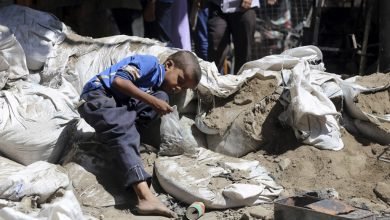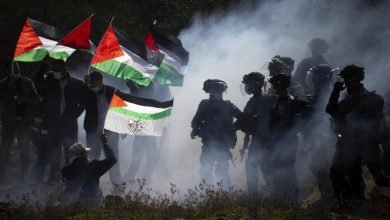middle east
South Syrian rebels agree surrender deal, Assad takes crossing
[su_label type=”info”]SMA News – Agencies [/su_label][su_spacer size=”10″] South Syrian rebels agreed to give up arms in a Russian-brokered ceasefire deal on Friday, rebel sources said, surrendering Deraa province to the government in another major victory for President Bashar al-Assad and his Russian allies.
The Syrian government recovered the Nassib border crossing with Jordan, held by rebels for three years, state media reported, after an assault in insurgent territory along the frontier backed by Russian air strikes.
A state television correspondent said the rebels had agreed to hand over heavy and medium weapons in all the towns and cities included in the surrender deal.
Rebel sources said Russia would guarantee the safe return of civilians who fled the government offensive in the biggest exodus of the war, with 320,000 people uprooted.
Seven years into the war which has killed hundreds of thousands of people, Assad now commands most of Syria with his allies’ help, though most of the north and a chunk of the east remains out of his hands. The presence of Turkish and U.S. forces in those areas will complicate further gains.
As Assad seeks victory, there seems little hope of a negotiated peace, with six million Syrians abroad as refugees and 6.5 million more internally displaced.
Russia has been at the forefront of the Deraa campaign, both bombing and negotiating with rebels who were told at the start of the offensive to expect no help from the United States.
Assad’s next target in the southwest appears to be rebel-held areas of Quneitra province at the frontier with the Israeli-occupied Golan Heights, where fighting between insurgents and the government escalated on Friday.
Israel said it had targeted a Syrian army post that shelled a frontier “buffer zone” in the Golan area.
Government advances in Deraa since mid June had brought large parts of the province back under state control.
Taking back the Nassib crossing paves the way for Assad to reopen a trade artery vital to his hopes of reviving the Syrian economy and starting to rebuild government-held areas.
Russian guarantees will also be extended to rebel fighters who wish to “settle their status” with the government – a process by which former insurgents accept to live under state rule again, the rebel sources said.
Rebels who did not wish to come back under Assad’s rule would leave for the insurgent stronghold in northwest Syria, they said.
It echoes the terms of previous opposition surrenders, but according to rebel sources, they also secured a concession that some government forces would withdraw from the area.
Russian military police would deploy instead with local forces overseen by Russia also deployed, they said.
The deal is to be rolled out across rebel-held areas of Deraa in phases, but there is no timeline as yet, said Abu Shaima, spokesman for an operations room for rebels under the Free Syrian Army banner.
The initial phases will cover the area along the border with Jordan, rather than the parts of northwestern Deraa around the city of Nawa, he said.
The Syrian government recovered the Nassib border crossing with Jordan, held by rebels for three years, state media reported, after an assault in insurgent territory along the frontier backed by Russian air strikes.
A state television correspondent said the rebels had agreed to hand over heavy and medium weapons in all the towns and cities included in the surrender deal.
Rebel sources said Russia would guarantee the safe return of civilians who fled the government offensive in the biggest exodus of the war, with 320,000 people uprooted.
Seven years into the war which has killed hundreds of thousands of people, Assad now commands most of Syria with his allies’ help, though most of the north and a chunk of the east remains out of his hands. The presence of Turkish and U.S. forces in those areas will complicate further gains.
As Assad seeks victory, there seems little hope of a negotiated peace, with six million Syrians abroad as refugees and 6.5 million more internally displaced.
Russia has been at the forefront of the Deraa campaign, both bombing and negotiating with rebels who were told at the start of the offensive to expect no help from the United States.
Assad’s next target in the southwest appears to be rebel-held areas of Quneitra province at the frontier with the Israeli-occupied Golan Heights, where fighting between insurgents and the government escalated on Friday.
Israel said it had targeted a Syrian army post that shelled a frontier “buffer zone” in the Golan area.
Government advances in Deraa since mid June had brought large parts of the province back under state control.
Taking back the Nassib crossing paves the way for Assad to reopen a trade artery vital to his hopes of reviving the Syrian economy and starting to rebuild government-held areas.
Russian guarantees will also be extended to rebel fighters who wish to “settle their status” with the government – a process by which former insurgents accept to live under state rule again, the rebel sources said.
Rebels who did not wish to come back under Assad’s rule would leave for the insurgent stronghold in northwest Syria, they said.
It echoes the terms of previous opposition surrenders, but according to rebel sources, they also secured a concession that some government forces would withdraw from the area.
Russian military police would deploy instead with local forces overseen by Russia also deployed, they said.
The deal is to be rolled out across rebel-held areas of Deraa in phases, but there is no timeline as yet, said Abu Shaima, spokesman for an operations room for rebels under the Free Syrian Army banner.
The initial phases will cover the area along the border with Jordan, rather than the parts of northwestern Deraa around the city of Nawa, he said.







